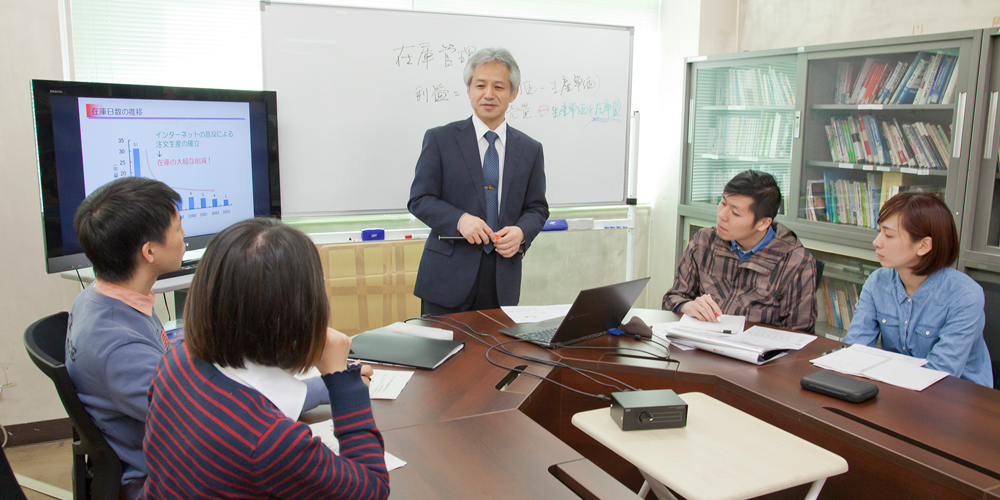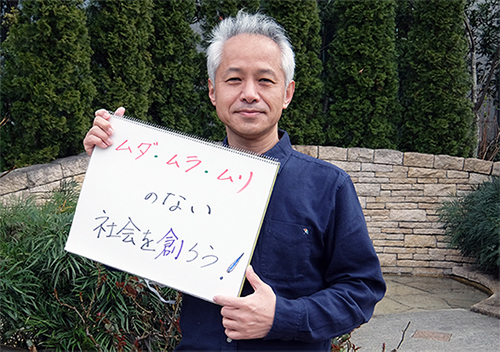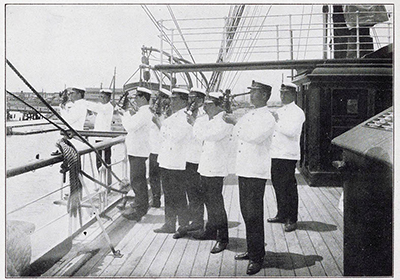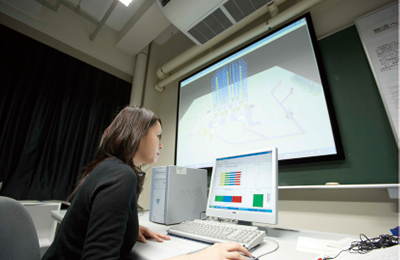People who convey voices from the sea
People who convey voices from the sea

In an ever-changing society
suitable mechanism
Professor Hisayuki Kurokawa, Department of Distribution Information Engineering, Faculty of Ocean Engineering
In an ever-changing society
suitable mechanism
Professor Hisayuki Kurokawa, Department of Distribution Information Engineering, Faculty of Ocean Engineering

Biography
Hisayuki Kurokawa(Kurokawa Hisayuki)
Belongs to the Department of Distribution Information Engineering.
Transferred from National Institute of Technology, Yuge College to Tokyo University of Mercantile Marine,
After completing graduate school at Tokyo University of Mercantile Marine, entered graduate school at the University of Tokyo.
In 1996, he became an assistant professor at the Tokyo University of Mercantile Marine, and later became an associate professor.
In 2003, he became an associate professor at Tokyo University of Marine Science and Technology due to the merger of the universities.
He has been in his current position since 2011 years.
2018-2021 Director of Tokyo University of Marine Science and Technology (in charge of industry-academia collaboration)
- Q What kind of classes do you teach?
↓
- I am in charge of logistics management engineering (distribution information engineering department 2nd year).
(Other: work management engineering (3rd year), distribution information engineering experiments, work management engineering, logistics simulation engineering, etc.)
For example, even if you manufacture and sell an explosively popular product, if you hold a large amount of inventory when the product stops selling, you will end up in the red.
From a management perspective, this is an example of how good or bad inventory management can affect business performance.
Therefore, in logistics management engineering, you will learn how to decide what (product), when (time to order), and how much (order quantity) to order, which are the basics of inventory management. - Q Why does Tokyo University of Marine Science and Technology have a Undergraduate Course of Logistics and Information Engineering?
↓
- Tokyo University of Marine Science and Technology, the predecessor of Tokyo University of Marine Science and Technology, has been training navigators and engineers*.
Logistics by ship (maritime transportation) is an indispensable means of transportation.
Especially in Japan, which is an island nation, most of the imported and exported products are shipped by ship, but shipping by ship is not unlimited.
You need to carry what you need, where you need it, when you need it.
To that end, it is also important to have technology for accurately and quickly transmitting and sharing information.
Against this background, the Department of Distribution and Information Engineering, a department for learning and researching logistics, distribution, and information, was born at the university.
In Japan, there are not many departments where you can specialize in distribution and logistics, so I think it is a rare department. 2 Astronomical observation
2 Astronomical observation - Q What kind of research are you doing?
↓
- Focusing on the logistics industry, based on various data acquired at actual work sites, we aim to find out how anyone can improve the site and improve efficiency by making decisions based on what kind of analysis and what criteria. , methods of analysis, methods of setting standards, and methods of creating an overall system.
When you hear the word efficiency, you may think of cost reduction and labor cost reduction.
However, what is really important is to create an environment where the leeway (funds and human resources) created by streamlining and eliminating waste can be invested in places and things that have not been used until now, and to be able to take on challenges that will benefit the company. .
If there is a company with sales of 1 million yen and XNUMX% of that is profit, simply thinking about it, the only way to double the profit is to aim for sales of XNUMX million yen.
But the truth is, if you change your perspective and find 1% of wasteful expenses and reduce them, you can double your profits.
Looking at the whole picture, I believe that if everyone can decide what kind of improvements are needed now, society will become better, and I would like to help with that. - Q Do you conduct research together with people from companies at actual work sites?
↓
- Well, since we are dealing with actual work as a theme, we sometimes contract with companies to provide data and analyze it with students.I collaborate with people in charge of various companies and promote research while communicating.
Recently, not only logistics companies but also manufacturers are focusing on improving logistics sites, so we are collaborating with a wide range of industries.
- Q What made you decide to become a researcher?
↓
- Originally, I wanted to be a sailor, so I entered the Tokyo University of Mercantile Marine.I was born on an island in the Seto Inland Sea, and everyone around me was involved in ship-related work.His grandfather was also a shipwright.
You naturally decided your course.
However, when I went to graduate school, I did research on home delivery and became interested in the structure of logistics.
Don't you think that courier services can send things to very far places at a low price?
Of course, if you just want to deliver the parcel to the next town, it's a short drive and it doesn't seem to cost that much.
However, ingenuity is required when considering transporting to a distant place.
The point of home delivery is the "mechanism" of collecting parcels once at a collection point and transporting parcels to be delivered in the same direction.
Intrigued by this kind of mechanism, I began to study logistics. - Q: Looking ahead to 2030, what kind of research would you like to do with incoming students?
↓
- I feel that society, not just the logistics industry, is undergoing major changes.
Especially in the logistics industry, there are parts that have not seriously tried to improve the efficiency of logistics until now, and there are places where intuition, experience and courage (KKD) are the ones to go around.
Therefore, I feel that there are many things that can be improved and changed to suit the future society.
Furthermore, due to labor shortages, there is a pressing need to improve the efficiency of logistics sites.
Also, compared to other countries, logistics in Japan is more delicate and complicated than other countries, so I think it is necessary to accurately grasp the overall situation and devise various points in order to achieve appropriate efficiency.
Therefore, if someone who graduates from the distribution information engineering department and has knowledge of logistics can find employment in a wide range of fields, from manufacturing sites and manufacturers to retail stores, I believe that they will be able to play an active role.
In fact, little by little, there is a movement among graduates who have found employment in other fields to collaborate with each other and start projects for improvement.
I hope that the students who will be enrolling from now on will join us in creating a system that is suitable for a society that is constantly changing.






